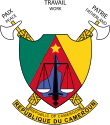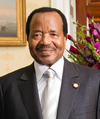Portal:Cameroon
The Cameroon Portal
Cameroon, officially the Republic of Cameroon, is a country in Central Africa. It shares boundaries with Nigeria to the west and north, Chad to the northeast, the Central African Republic to the east, and Equatorial Guinea, Gabon and the Republic of the Congo to the south. Its coastline lies on the Bight of Biafra, part of the Gulf of Guinea and the Atlantic Ocean. Due to its strategic position at the crossroads between West Africa and Central Africa, it has been categorized as being in both camps. Its nearly 27 million people speak 250 native languages, in addition to the national tongues of English and French, or both. Cameroon became a German colony in 1884 known as Kamerun. After World War I, it was divided between France and the United Kingdom as League of Nations mandates. The Union des Populations du Cameroun (UPC) political party advocated independence, but was outlawed by France in the 1950s, leading to the national liberation insurgency fought between French and UPC militant forces until early 1971. In 1960, the French-administered part of Cameroon became independent, as the Republic of Cameroun, under President Ahmadou Ahidjo. The southern part of British Cameroons federated with it in 1961 to form the Federal Republic of Cameroon. The federation was abandoned in 1972. The country was renamed the United Republic of Cameroon in 1972 and back to the Republic of Cameroon in 1984 by a presidential decree by president Paul Biya. Biya, the incumbent president, has led the country since 1982 following Ahidjo's resignation; he previously held office as prime minister from 1975 onward. Cameroon is governed as a Unitary Presidential Republic. The official languages of Cameroon are French and English, the official languages of former French Cameroons and British Cameroons. Christianity is the majority religion in Cameroon, with significant minorities practising Islam and traditional faiths. It has experienced tensions from the English-speaking territories, where politicians have advocated for greater decentralisation and even complete separation or independence (as in the Southern Cameroons National Council). In 2017, tensions over the creation of an Ambazonian state in the English-speaking territories escalated into open warfare. (Full article...) Selected article -The Cameroonian economic crisis was a downturn in the economy of Cameroon from the mid-1980s to the early 2000s. The crisis resulted in rising prices in Cameroon, trade deficits, and loss of government revenue. The government of Cameroon acknowledged the crisis in 1987. Outside observers and critics blamed poor government stewardship of the economy. The government instead placed the blame on the fall of the prices of export commodities, particularly a steep drop in the price of petroleum. President Paul Biya announced that "all our export commodities fell at the same time." Cameroon's trade partners, particularly France, Germany, and the United States, offered to help the country, but Cameroon balked at their condition that the country follow strict cost cutting suggestions laid out by the International Monetary Fund (IMF). Instead, Cameroon formulated its own plan. Civil servants lost access to subsidised electricity, housing, and telephones; parts of the government's vehicle fleet were sold; older civil servants were forced into retirement; the official working schedule was changed; economic missions in foreign embassies from Cameroon were closed; and state and parastatal enterprises were privatised. The 1987–1988 budget reduced government spending by 18%, the first time in the country's history that the budget decreased. The measures met with international approval, but violent crime rose as a result. Cameroon's plan also failed to rein in corruption. By October 1988, the intended effect was less than had been hoped, and Cameroon agreed to an IMF aid package worth $150 million and accepted a structural adjustment program (SAP) loan from the World Bank. The African Development Bank, France, Germany, and the United Kingdom loaned the government further funds. Cameroon has since focused on paying off its international debt and further restricting public salaries and pay rises to civil servants. (Full article...)Did you know (auto-generated)More did you know -
General images -The following are images from various Cameroon-related articles on Wikipedia.
WikiProjectsTopicsCategoriesRelated portalsAssociated WikimediaThe following Wikimedia Foundation sister projects provide more on this subject:
Discover Wikipedia using portals | ||||






























































